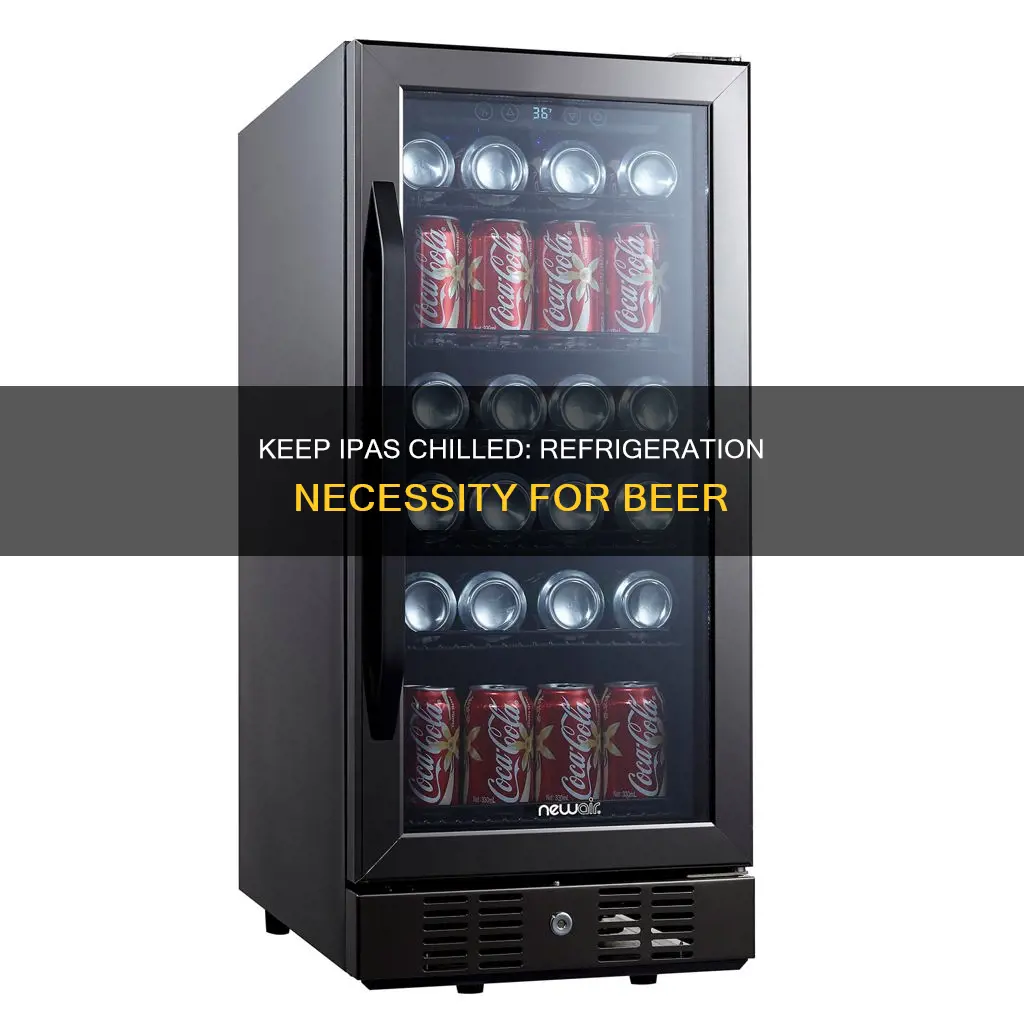
India Pale Ale (IPA) is a type of beer known for its hoppy bitterness and flavour. While personal preference may dictate the ideal drinking temperature, proper storage is crucial to maintaining the quality of the beer and preventing spoilage. Exposure to sunlight, oxygen, and bacteria can negatively affect the taste and freshness of IPA, and refrigeration can help slow down these processes. However, quick temperature changes and extreme cold can also impact the beer's stability and flavour. Understanding the optimal storage conditions and serving temperatures for IPA can enhance the drinking experience and ensure the beer remains in its best condition.
What You'll Learn
- IPAs can be stored at room temperature for a few days without any noticeable difference in taste
- Refrigeration helps to slow down the aging process of beer
- Beer should be stored in a dark place to prevent it from being lightstruck
- Beer should be stored upright to minimise contact with oxygen
- Beer can be drunk past its best-before date but it is likely to be flat or dissatisfying

IPAs can be stored at room temperature for a few days without any noticeable difference in taste
India Pale Ales (IPAs) are a type of beer that can be stored at room temperature for a few days without any noticeable difference in taste. While it is generally recommended to store beer in a cool, dark place to maintain its quality and prevent spoilage, brief periods at room temperature are not detrimental.
Beer is sensitive to changes in temperature, and sudden fluctuations can affect its stability. However, allowing beer to warm up from the refrigerator to room temperature once or twice is not a significant issue if it will be consumed within 30-45 days. Most craft beer is stored at room temperature during shipping and distribution, so it is not unusual for beer to experience temperature variations before reaching the consumer.
IPAs, in particular, have a higher tolerance to room temperature storage due to their historical origins. The style originated from beers heavily hopped for long journeys at room temperature to India, where hops acted as a preservative. As a result, IPAs can retain their qualities for a short period at room temperature, and you can expect minimal impact on flavour.
It is worth noting that the ideal storage temperature for IPAs is between 45 and 55 degrees Fahrenheit (approximately 7 to 13 degrees Celsius). Storing IPAs at these temperatures will optimise their shelf life and minimise any flavour loss. While room temperature storage for a few days is acceptable, prolonged exposure to higher temperatures will accelerate spoilage and oxidation, leading to a decline in beer quality.
IPA Beers in Mexico: Exploring the Craft Scene
You may want to see also

Refrigeration helps to slow down the aging process of beer
Beer, like wine, can be aged and refrigeration plays a key role in slowing down the ageing process. The ideal temperature for storing beer is between 50° and 55° Fahrenheit, but some collectors prefer to store beer at an even colder temperature, around 45°F, to slow oxidation. Storing beer at a low temperature usually requires a dedicated refrigerator, which is a common choice for beer enthusiasts.
Beer should be stored in a cool, dark place, as light and heat can cause the beer to go bad. A photochemical reaction occurs when light hits beer, causing the alpha acids that make the beer bitter to break down and form "skunky" off-flavours. Heat can also ruin a beer in terms of aroma and flavour, as well as its chemical makeup. Therefore, refrigeration helps to maintain a consistent, cool temperature, slowing down the ageing process.
While refrigeration is important, it is not necessary to keep beer refrigerated at all times. Beer can be stored at room temperature for a few days without any noticeable difference in flavour. However, rapid temperature changes can be detrimental to the beer's long-term stability. Therefore, it is best to avoid frequent temperature fluctuations and aim for a consistent, cool temperature to slow down the ageing of the beer.
In addition to temperature and light control, humidity is also a factor to consider when storing beer. The ideal humidity level is between 50% and 70%. Too low humidity can cause corks to dry out, while too high humidity can lead to mould growth. By controlling temperature, light, and humidity, refrigeration helps to create the optimal environment to slow down the ageing process of beer.
Explore the World of IPA Beers and Their Unique Taste
You may want to see also

Beer should be stored in a dark place to prevent it from being lightstruck
To avoid light-struck beer, it is best to store beer in opaque containers like kegs, cans, ceramic bottles, or stainless steel bottles. These containers provide a barrier that blocks out the ultraviolet rays and prevents the chemical reaction that creates MBT. If you are using glass bottles, opt for brown glass bottles, which are more effective at blocking ultraviolet rays than green or clear glass. Even brown glass bottles, however, are not 100% insulated from light, so it is essential to store them in a dark place.
Additionally, artificial lighting can also contribute to light-struck beer. Lights with wavelengths between 350 and 550 nanometers, such as LED or fluorescent lighting, are more likely to cause skunkiness in beer. Therefore, it is advisable to cover carboys (glass or plastic brewing vessels) with blankets or boxes or use light-blocking drapes in the brewing room.
By taking these precautions and storing beer in dark places, you can prevent light-struck beer and ensure that your beverage remains enjoyable and free from unpleasant odours and flavours.
Guinness Beer: A Source of Vitamins?
You may want to see also

Beer should be stored upright to minimise contact with oxygen
Beer should always be stored upright to minimise contact with oxygen. This is because, with the bottle's slim neck, less beer is exposed to oxygen when stored upright, which slows the rate of oxidation. Storing beer upright also ensures that the yeast settles at the bottom of the bottle, minimising its influence on the flavour of the beer.
Oxidation is a major contributor to the degradation of beer flavour, quality, and colour. It also negatively impacts the beer's shelf life. The oxidative process can also lead to the development of an unpleasant metallic flavour as the beer ages.
Oxidation in pale beers can result in the formation of the compound trans-2-nonenal, which creates flavours similar to paper or lipstick. This compound has a very low flavour threshold, with as little as 0.1 parts per billion able to be identified in beer.
Oxidation in dark beers tends to affect the beer differently. As they age, the rich malt aromas and flavours are replaced by sweet, sherry-like tones. These flavours are primarily the result of the oxidation of the malt flavour molecules in beer, creating the compound benzaldehyde. While these sherry-like aromas and flavours can be quite appealing, they can present the beer quite differently from its original characteristics.
It is worth noting that the impact of removing beer from refrigeration and returning it to room temperature is not as significant as some may believe. While beer does like to be stored cold and will last longer if stored at a steady cool temperature, buying beer that has been refrigerated and then storing it outside the fridge until consumption will not harm the beer.
Guinness Beer Alternatives: Exploring Dark Beer Options
You may want to see also

Beer can be drunk past its best-before date but it is likely to be flat or dissatisfying
Beer typically has a 'best before' date, as opposed to a use by date. This means that it is safe to drink past this date, but the quality of the beer will likely have deteriorated. Beer is susceptible to bacteria, chemical reactions, and oxygen exposure, which can all cause it to go bad.
The higher the alcohol content, the less concerned you need to be with the use-by date. Beers with a high alcohol content, such as stouts and barley wines, can improve with age. However, IPAs, especially hoppy ones, do not fall into this category. They gradually lose their flavour and are best consumed sooner rather than later.
If you're looking to store beer, it's best to keep it in the fridge, as refrigeration protects it from direct sunlight. Beer can be stored in a dark place at room temperature, but this will shorten its lifespan.
In summary, while it is safe to drink beer past its best-before date, it is likely to be flat and of poorer quality.
Guinness Beer: Available in India?
You may want to see also
Frequently asked questions
It is recommended to refrigerate IPA beer to preserve its quality and prevent spoilage. Refrigeration slows down the aging process and protects the beer from the effects of UV rays and heat. However, it is not mandatory, and IPA beer can be stored at room temperature for a short period without significant negative effects.
If IPA beer is not refrigerated, it may be more prone to spoilage due to exposure to sunlight, oxygen, and bacteria. The quality of the beer may decline faster, and it may lose some of its hoppiness and IPA qualities. However, it is unlikely to make you sick, and the effects may not be noticeable if the beer is consumed within a short period.
Yes, it is generally safe to drink IPA beer that has been left unrefrigerated. Beer has a high alcohol content, which acts as a natural preservative, making it difficult for bacteria to survive. While the beer may lose some of its flavour or freshness, it is unlikely to make you ill.
The optimal temperature for storing and serving IPA beer varies depending on personal preference and the specific type of IPA. Modern hop-forward IPAs are typically served between 5-8 degrees Celsius, while cask "real ale" IPAs are served "cellar cool" at around 8-12 degrees Celsius. Storing IPA beer at a cool, consistent temperature will help maintain its quality and freshness.







